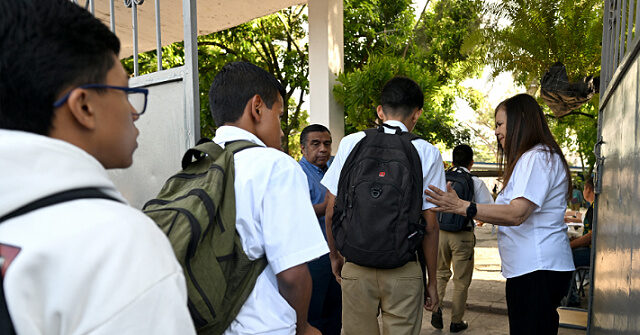The government of El Salvador implemented mandatory nationwide dress and hairstyle codes for the nation’s schools this week to “strengthen discipline and civic values” among public school students.
The code, which went into effect on Wednesday, calls for students to wear a clean and tidy uniform and appropriate haircuts. Students must also exhibit proper presentation and enter schools in an orderly manner and with “respectful greetings.”
The code was one of the first measures signed by El Salvador’s new education minister, Karla Trigueros, who was sworn in to the position by President Nayib Bukele last week. Trigueros shared a copy of the memorandum on social media this week.
“To build the El Salvador we dream of, it is clear that we must completely transform our education system,” Bukele wrote on Monday before reciting the nation’s motto, “God, Union, Freedom.”
“We are trying to bring civility and patriotism back into our schools. By encouraging these kinds of measures, we are planting the seed of conscious and respectful citizenship in each student as part of their comprehensive education that goes beyond academics, thus preparing them to be good citizens in society,” Trigueros reportedly said this week.
The memorandum places every school principal as the individual primarily responsible for overseeing compliance with the dress code and calls for them to assume their “role as models of order and discipline for students, teachers, and administrative staff.” Starting on Wednesday, August 20, school directors must receive students at the entrance of the institution and ensure that students are in compliance with the new rules.
On Friday, the Salvadoran Education Ministry published photos of Trigueros visiting several education centers to check the compliance with the new dress codes.
Javier Hernández, head of a local private school union, praised the measures in remarks given to a local outlet on Thursday evening. In the remarks, shared by President Bukele on social media, Hernández asserted that the new measures reinforce private institutions’ own internal rules, allowing the schools to “regain the power that had been taken from us.”
“And that is why we have now taken this very seriously, and what we will be able to do now is apply the regulations more rigorously. Because that is clear, we can now call attention to haircuts, artificial eyelashes, acrylic nails, and makeup,” Hernández said.
The Salvadoran newspaper La Prensa Grafica reached out to local teachers’ unions this week, who expressed to be in agreement with discipline and order in students’ dress codes, but argued that the responsibility should not be in the hands of principals, arguing that “their duties are established in the Teaching Career Law.”
“We agree that authority should be restored to teachers, which had been lost to some extent. We have cases of students in schools who come to class wearing T-shirts, and teachers can’t say anything to them because they will report them on SALVE [El Salvador’s Violence Alert System in Education platform],” a union representative reportedly said.
“We agree with discipline, but not with the way it is being enforced, that is, the way in which these measures are being implemented. Each institution has its own regulations, and they are inventing offenses that do not legally exist,” another representative said.
On Thursday, Trigueros published a memorandum implementing “Civic Mondays” in the nation’s schools. Starting on Monday, September 1, and on every subsequent Monday, every Salvadoran school will carry out a series of activities aimed at “strengthening national identity, civic values, and discipline in our student community.”
“The civic ceremony will take place during the first half hour of the school day and will include, at a minimum, the following activities: Training in order and discipline. Entrance of the National Flag. Singing of the National Anthem. Prayer to the Salvadoran flag. Presentation by a student on a notable figure from El Salvador or a relevant historical event. Retirement of the national flag,” the memorandum detailed.
Trigueros also instructed that a $300 stipend is given to every school for the purchase of “flags, white gloves for the flag bearer, or other needs related to this activity that the principal deems relevant.”
School uniform dress codes for both public and private schools are a long-time common practice in El Salvador and across Latin America, and each country has its own unique set of rules. In some cases, such as Peru, the use of uniforms is not mandatory in public schools, while in Venezuela, uniforms are compulsory, with students wearing either a white, light blue, or beige shirt depending on which grade they are currently studying.
“If we want to build the country we deserve, we must break paradigms. The new minister, in her dual capacity as captain and doctor, has demonstrated the ability, leadership, and commitment necessary to drive a profound transformation in our education system,” Bukele wrote on social media last week during Trigueros’ inauguration as minister.
Christian K. Caruzo is a Venezuelan writer and documents life under socialism. You can follow him on Twitter here.
Read the full article here
